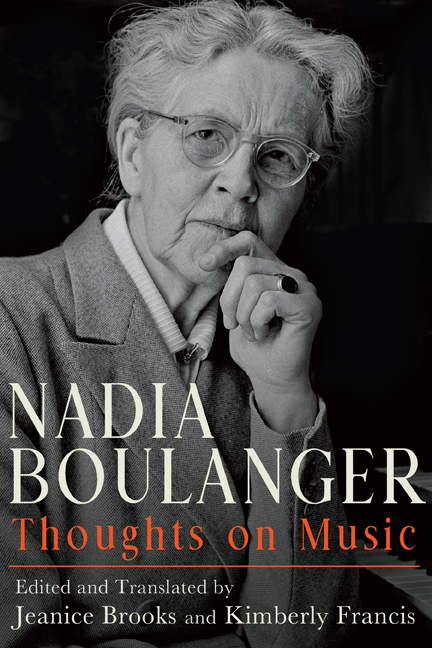Book contents
- Frontmatter
- Contents
- List of Illustrations
- Acknowledgments
- Editorial Apparatus and Critical Notes
- Note on Translations
- List of Abbreviations
- Timeline of Nadia Boulanger’s Life
- Introduction
- Part One Journalism, Criticism, Tributes
- Part Two Lectures, Classes, Broadcasts
- Bibliography of Nadia Boulanger’s Published Writing
- General Bibliography
- Index
In Memoriam: André Caplet, untitled contribution to Hommage à André Caplet, edited by Yvonne Gouverné. Saint-Leger Vauban: Zodiaques, 1978, 55-56 (complete text)
Published online by Cambridge University Press: 15 October 2020
- Frontmatter
- Contents
- List of Illustrations
- Acknowledgments
- Editorial Apparatus and Critical Notes
- Note on Translations
- List of Abbreviations
- Timeline of Nadia Boulanger’s Life
- Introduction
- Part One Journalism, Criticism, Tributes
- Part Two Lectures, Classes, Broadcasts
- Bibliography of Nadia Boulanger’s Published Writing
- General Bibliography
- Index
Summary
André Caplet—these simple syllables have something magical about them, because, when thinking of Caplet at the piano, one is before a pianist … [when] directing an orchestra, a conductor … [when] a composer, a certain sensitivity.
It was in my piano accompaniment class, taught by Paul Vidal (who seemed to have read everything to do with music), that I made the acquaintance of André Caplet, around 1900. He stunned us with his facility, his comprehension, his ability to apply himself to all the elements of this rather difficult subject: to be ready to do everything at all times.
My friend was of an unyielding loyalty and kindness. My little sister, between the ages of six and twelve, received from André Caplet a gesture that gives new meaning to the word “kindness.” He adapted himself without ever overindulging her childish fantasies. At the time, we were at Trouville, and he was staying with his parents at Le Havre from where he came to see us. What great joy Lili took in causing him to miss his boat and therefore prolong his visit. With what spontenaeity and good grace he took part in this childish game! One wound up wondering whether he had regained the boyish soul of his youth.
What comments would be suitable to evoke this life of his, sometimes tumultuous, yet always rich, and forever dominated by an inextinguishable love of music! He was always ready to play, to conduct, to compose, guided by his intuition, controlled by his reason. He perceived the most subtle inflections, rendering them noticeable by drawing out the grande ligne and bearing witness to his understanding, which was never caught unawares.
Let's not forget his memorable performances: the first performance of the Martyre de Saint Sébastien in 1911, his first performance of Pelléas et Mélisande in Boston in 1912, among others, and let's think of the character of such varied works as his, such as his mélodies, his Masque de la mort rouge, his Miroir de Jésus, his a cappella Mass—it is the same and yet a different personality that draws each of these out.
One must hope for the publication of his letters, his manuscripts, so as to permit to those who would have loved him, if only they had known him, to feel, one more time, that death does not erase life.
- Type
- Chapter
- Information
- Nadia BoulangerThoughts on Music, pp. 312 - 314Publisher: Boydell & BrewerPrint publication year: 2020

